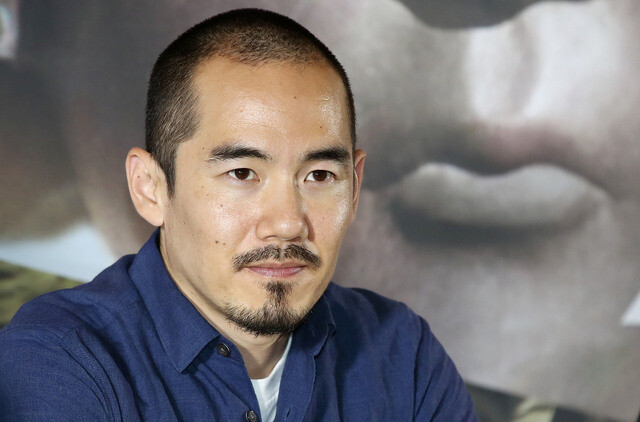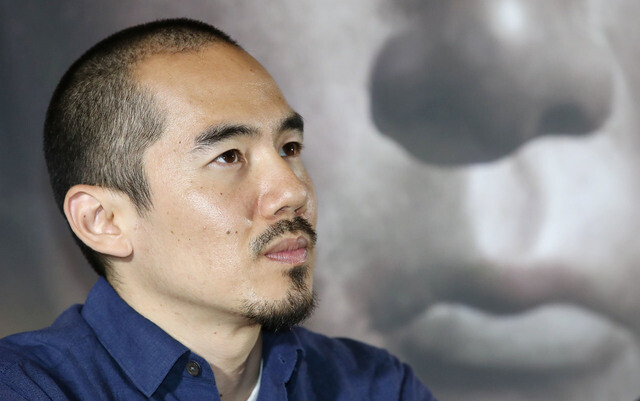hankyoreh
Links to other country sites 다른 나라 사이트 링크
[Interview] Forming one’s individual perspective on the comfort women issue

“The Abe administration keeps trying to turn an issue of human rights into a source of conflict between South Korea and Japan. They’re trying to consolidate their base by riling up hatred and hostility for South Korea among the Japanese. But if the Japanese had a proper understanding of the history of forced labor and the comfort women, I doubt this would happen. When the voices of the victims are removed from the picture, the issue of human rights violations is covered up, which leads to the error of viewing this as a diplomatic issue between two countries. The comfort women agreement that the Park administration reached with Japan in 2015 was the product of that kind of error.”
During an hour-long interview at the CGV theater in the Apgujeong neighborhood, in Seoul’s Gangnam District, on July 17, Mike Dezaki used the phrase “human rights” more than 20 times. Dezaki, 36, is the director of “Shusenjo: The Main Battleground of the Comfort Women Issue,” a documentary about women forced to provide sex for the Japanese imperial army. Such were euphemistically called “comfort women.” The film will debut in South Korea on July 25.

Comfort women issue is human rights issue, not diplomatic one
Dezaki was also vocal in his criticism of the Abe administration’s recent imposition of punitive economic measures on South Korea to retaliate against a Supreme Court ruling that awarded damages to Koreans forced to provide labor for Japanese companies during the colonial occupation. “That’s a human rights issue on the same lines as the comfort women issue,” the director said.
The Japanese-American filmmaker was working as an English teacher in Japan when he came under fire from the Japanese right wing after posting a video to YouTube about racism in Japan. That was when he learned that Takashi Uemura, a former reporter for the Asahi Shimbun newspaper who was the first to cover the comfort women issue, had faced similar attacks. Dezaki found himself wondering why the Japanese right wing is so sensitive about the comfort women issue. To answer that question, he personally interviewed some 30 figures from Japan’s right wing, interviews featured in his latest film.
When asked whether members of Japan’s right wing eagerly accepted his interview requests, Dezaki said, “While attending a symposium they’d organized, I introduced myself as a graduate student at Sophia University and asked them for interviews. During subsequent email correspondence, it wasn’t that hard to get their permission, aside from a little haggling about their request to see my footage first. They didn’t start making an issue of this until the film came out.”
When the film was released in Japan in April, right-wing members held a press conference against the screening and threatened to initiate legal proceedings. Though that might give rise to concerns about his personal safety, Dezaki doesn’t seem too worried. “The main issues have been an attempt to dox me on Twitter, rumors that I’m anti-Japanese, speculation that I’m in the pay of the South Korean government, and protest calls to my film distributor. There hasn’t been any explicit violence. I guess that’s because the film has boosted my social standing,” the filmmaker said with a smile.
Dezaki’s emotional detachment from issue
“Shusenjo” is a “debate film” that presents arguments and counterarguments by Japanese right wing members and other scholars and activists from South Korea, the US, and Japan. The unique circumstances of Dezaki’s birth — neither a citizen of Japan nor Korea — has a major impact on the film’s perspective. “The fact that I don’t have any emotional attachment to this issue seems to have created the appropriate distance. The fact is it doesn’t matter to me who wins in the ‘battle over history.’ But since the comfort women issue is so wide-ranging, my goal was to pay heed to both sides,” Dezaki said.
While Dezaki made this film with the hope that listening to each other’s positions and learning new things might help broaden understanding, he also says he’s realized how hard it is to bridge the gap between South Korea and Japan. “The two sides have completely different conceptions of ‘sex slaves’ and ‘forced mobilization,’ and those conceptions are backed up by different interpretations of the historical evidence. I’ve arranged this film such that viewers can decide for themselves which side is more persuasive.”
The film cites a comfort woman statue that went up in Glendale, California, in 2013 — the first such statue outside South Korea — as an example of how the “main battleground” of the comfort women issue is shifting to the US. “The Japanese right wing believes that, if they change the American viewpoint, they can change the global viewpoint. And since they’re sure they’ve already won the ‘war over history,’ they don’t want the younger Japanese generation to find contradictions [with the information they already know] when they read about the comfort women in English. That’s why they’re setting up websites in English and supporting pro-Japanese YouTubers.”
Not all the content of the film will sit well with Koreans, such as its claim that the oft-cited estimate of 200,000 comfort women isn’t accurate. Dezaki was always aware that his film would be controversial both in South Korea and Japan. “I’m working toward a conclusion of my own, but not everyone is going to agree with that. I want this to be a challenging film. In that sense, I’m really excited to see how Koreans will respond.”
By Yu Sun-hui, staff reporter
Please direct comments or questions to [english@hani.co.kr]

Editorial・opinion
![[Column] Season 2 of special prosecutor probe may be coming to Korea soon [Column] Season 2 of special prosecutor probe may be coming to Korea soon](https://flexible.img.hani.co.kr/flexible/normal/500/300/imgdb/original/2024/0426/3317141030699447.jpg) [Column] Season 2 of special prosecutor probe may be coming to Korea soon
[Column] Season 2 of special prosecutor probe may be coming to Korea soon![[Column] Park Geun-hye déjà vu in Yoon Suk-yeol [Column] Park Geun-hye déjà vu in Yoon Suk-yeol](https://flexible.img.hani.co.kr/flexible/normal/500/300/imgdb/original/2024/0424/651713945113788.jpg) [Column] Park Geun-hye déjà vu in Yoon Suk-yeol
[Column] Park Geun-hye déjà vu in Yoon Suk-yeol- [Editorial] New weight of N. Korea’s nuclear threats makes dialogue all the more urgent
- [Guest essay] The real reason Korea’s new right wants to dub Rhee a founding father
- [Column] ‘Choson’: Is it time we start referring to N. Korea in its own terms?
- [Editorial] Japan’s rewriting of history with Korea has gone too far
- [Column] The president’s questionable capacity for dialogue
- [Column] Are chaebol firms just pizza pies for families to divvy up as they please?
- [Column] Has Korea, too, crossed the Rubicon on China?
- [Correspondent’s column] In Japan’s alliance with US, echoes of its past alliances with UK
Most viewed articles
- 1Is Japan about to snatch control of Line messenger from Korea’s Naver?
- 2‘We must say no’: Seoul defense chief on Korean, USFK involvement in hypothetical Taiwan crisis
- 3Up-and-coming Indonesian group StarBe spills what it learned during K-pop training in Seoul
- 4[News analysis] Using lure of fame, K-entertainment agency bigwigs sexually prey on young trainees
- 5[Column] Park Geun-hye déjà vu in Yoon Suk-yeol
- 6Is N. Korea threatening to test nukes in response to possible new US-led sanctions body?
- 7Division commander ordered troops to enter raging flood waters before Marine died, survivor says
- 8S. Korea “monitoring developments” after report of secret Chinese police station in Seoul
- 9Will NewJeans end up collateral damage in internal feud at K-pop juggernaut Hybe?
- 10Report reveals toxic pollution at numerous USFK bases